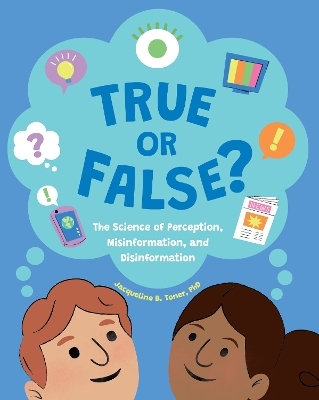
True or False?
The Science of Perception, Misinformation, and Disinformation
Seiten
2024
Magination Press, (American Psychological Association) (Verlag)
978-1-4338-4048-7 (ISBN)
Magination Press, (American Psychological Association) (Verlag)
978-1-4338-4048-7 (ISBN)
Written for pre-teens and young teens in lively text accompanied by fun facts, True or False? The Science of Perception, Misinformation, and Disinformation explores what psychology tells us about development and persistence of false perceptions and beliefs and the difficulty of correcting them, plus ways to debunk misinformation and think critically and factually about the world around us. This book explores how we think and perceive and why false beliefs, superstitions, opinions, misinformation, or wild guesses can just stick around and mess things up. You’ll see how misunderstandings and misuse of scientific findings can lead people to the wrong conclusions. Readers learn how to outsmart their brain to gain critical thinking skills and find ways to identify and correct false beliefs and disinformation.
Our big brains are super-efficient but glitchy. Scientists estimate that 90% of what we see, hear, smell, or sense never really sinks in. Instead, we pick up on the big things, general impressions, or important stuff and end up leaving our brains to fill in the missing info. And on top of that, people sometimes twist information on purpose. False beliefs can be shared from person to person or go viral in a flash, often by people who think the info is true.
So how in the world do we know what’s real, what’s true, or who to believe? Dig in and get the facts!
Our big brains are super-efficient but glitchy. Scientists estimate that 90% of what we see, hear, smell, or sense never really sinks in. Instead, we pick up on the big things, general impressions, or important stuff and end up leaving our brains to fill in the missing info. And on top of that, people sometimes twist information on purpose. False beliefs can be shared from person to person or go viral in a flash, often by people who think the info is true.
So how in the world do we know what’s real, what’s true, or who to believe? Dig in and get the facts!
Jacqueline B. Toner, PhD is a retired clinical psychologist with over 30 years in private practice working with children and parents. She earned her PhD from University of Virginia and serves as Chief Facilitator for a medical resources project with Johns Hopkins School of Public Health and Carnegie Mellon University. Dr. Toner has co-authored several books with Claire A. B. Freeland, PhD including What to Do When Mistakes Make You Quake;, What to Do When It's Not Fair; Psychology for Kids: The Science of Mind and Behavior; Depression: A Teen's Guide to Survive and Thrive; and Yes I Can: A Girl and Her Wheelchair. She is also the author of What to Do When the News Scares You. She lives in Baltimore, Maryland. Visit jacquelinetoner.net.
| Erscheinungsdatum | 22.07.2024 |
|---|---|
| Sprache | englisch |
| Maße | 203 x 254 mm |
| Themenwelt | Kinder- / Jugendbuch ► Sachbücher ► Geschichte / Politik |
| Kinder- / Jugendbuch ► Sachbücher ► Naturwissenschaft / Technik | |
| Schulbuch / Wörterbuch | |
| ISBN-10 | 1-4338-4048-0 / 1433840480 |
| ISBN-13 | 978-1-4338-4048-7 / 9781433840487 |
| Zustand | Neuware |
| Haben Sie eine Frage zum Produkt? |
Mehr entdecken
aus dem Bereich
aus dem Bereich
Unstoppable Us 2 | Der erfolgreichste Sachbuchautor der Welt gibt …
Buch | Hardcover (2023)
dtv Verlagsgesellschaft
20,00 €
Preisgekröntes Kindersachbuch mit beeindruckenden Infografiken. …
Buch | Hardcover (2024)
Gabriel in der Thienemann-Esslinger Verlag GmbH
15,00 €
Geschichte witzig und originell erzählt ab 10
Buch | Softcover (2024)
dtv Verlagsgesellschaft
10,00 €


